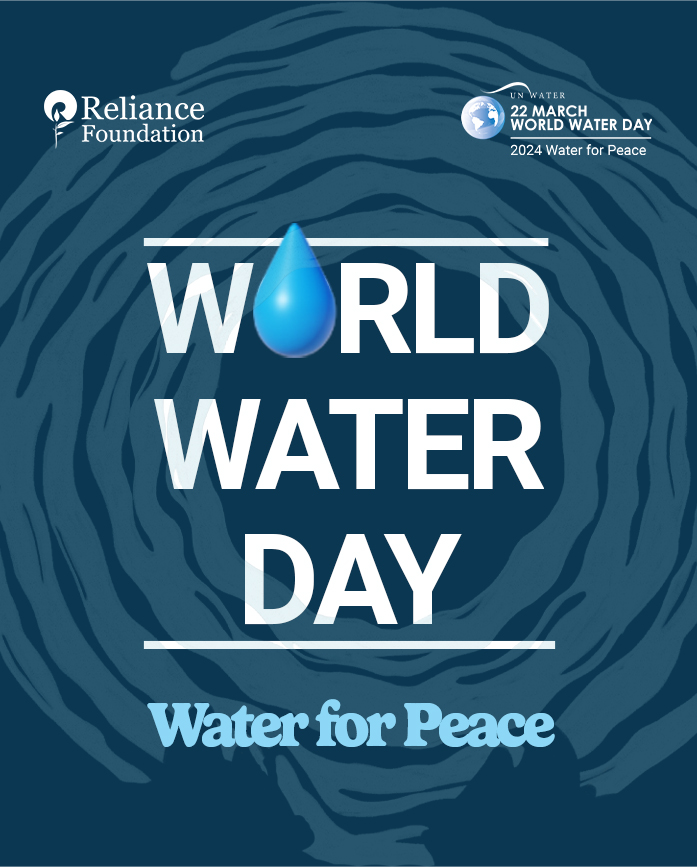Sustainable Water initiatives with and for communities

The United Nations World Water Day is observed every year on March 22 to bring attention to global issues around water and inspiring action to address these issues. This annual observance constitutes efforts towards achieving SDG 6: Water and Sanitation for All. Reliance Foundation works to support national priorities and global sustainable development goals to ensure inclusive development for all – with the underlying principle of ‘We Care’.
Reliance Foundation’s water related initiatives across India aim to ensure adequate water for agriculture and drinking purposes for rural households. Reliance Foundation supports communities in identifying their water needs and planning locally-relevant cost-effective solutions to improve availability of water and its management.
Since 2011, Reliance Foundation has helped enhance India’s water harvesting capacity by 1,634 lakh cubic metres. Its efforts have further led to effective water management on 65,092 hectares of land and improving of drinking water access in over 3,500 villages.
This was possible by uniting people in more than 4,700 villages, through village-level platforms, to prepare water resources management plans. Not only have these efforts contributed to prosperity, they have also led to peace through water, which is the theme for this year’s World Water Day.
Recognising water distress as a key inhibitor for remunerative farming, Reliance Foundation supports communities and smallholder farmers in identifying ways to improve water availability at community and farm levels. These efforts often result in improved or new water infrastructure, such as dams, ponds, tanks and wells, and sustainable and efficient use of water. Reliance Foundation also empowers communities with information to enable them in adopting climate-smart crops and farming practises.
This happens through the village resources planning exercises and through 300 plus Digital Farm Schools, which is another focus area in the Foundation’s approach to driving water-use efficiency. Further, to improve access to drinking water, Reliance Foundation strengthens supply and water distribution infrastructure in villages, ensuring clean and safe drinking water at the doorstep of homes.
An independent study of Reliance Foundation’s water related work in India found that there is a direct impact and trickle-down effect that contributes to holistic development in the intervention villages.
The study indicates:
• Increase in water harvesting capacity for agriculture resulted in the de-risking of rain-fed farming. For 89% of the farmers who were surveyed, rain was no longer a primary source for irrigation. Additionally, 79% farmers reported an increase in area under assured irrigation. Around 54% farmers adopted efficient irrigation techniques.
• Farmers who used to till their lands in one season started cultivating more than once. 85% farmers in the intervention villages now crop their fields two or more times a year, and more than half of the farmers cultivate three or more types of crops annually. In addition, diversification of crops was also observed.
• The efforts also led to reduced outbound migration, which observed to be about 12% in the intervention villages as compared to 28% in the control group.
• The increase in water availability for domestic purposes resulted in around 89% of the intervention village residents having the primary source of water within 200 meters of their house. Women in the intervention villages and control villages spend on average 25 and 40 minutes per day respectively. The reduction in time spent on fetching water adds 8 days’ income over a year for the women of the intervention villages.
This is the story of bringing hope and prosperity to Ghatpipariya village in Seoni district of Madhya Pradesh…
— Reliance Foundation (@ril_foundation) March 23, 2024
Small and marginal farmers in Ghatpipariya village faced the challenge of insufficient water for irrigation, especially during the crucial Rabi season. Working with… pic.twitter.com/B43DQpYoS6
The community-centered initiatives of Reliance Foundation have helped increase water availability and its access across India, especially for the marginalised and the underserved sections of the society, and reflect the Foundation’s commitment to ensure ‘Water for All’.




